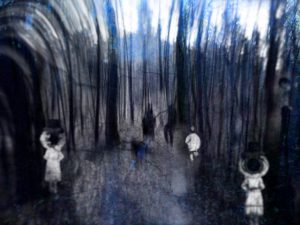
The following is part of SmokeLong‘s series Five From the Archive, which fulfills a need for teaching resources in the flash-narrative community and beyond. In this installment, Sharmini Aphrodite takes a look at five stories in the SmokeLong archives that have a first-person plural narrator.
_____________________
by Sharmini Aphrodite
Like first-person, first-person plural can take the reader into the intimacy of the narrator’s head. First-person plural, however, has a wider capacity: it invites the reader into a collective – it is both conspiratorial and communal. Being part of a community enrichens life: friendship, of course, requires another, and worship is often heightened by community in a way that is most evident in the singing of a chorus. The reader’s experience with first-person plural is thus one of significant intimacy. Yet first-person plural can also be used to do the exact opposite, establishing an in-group dynamic within a story that purposely excludes the reader, enhancing the narrators’ sense of mystery, the nature of which can be benign or threatening. Above all, and what I find most interesting about first-person plural, is how its communal voice induces a sense of the mythic. “We” cuts across oceans and peoples, across time and space. It can go on forever.
 “Whose Voice We Wanted to Hear” by Jacqueline Vogtman
“Whose Voice We Wanted to Hear” by Jacqueline Vogtman
The “we” in this story immediately establishes the group’s dynamics. There are our narrators – American, healthy, confident – and then there is the object of their interest – “the foreign girl” from a wartorn country, physically weak, whose name (Nadija) is revealed like an afterthought. The lines are drawn from the beginning, with Nadija’s singularity heightening her mystique. The story’s final line – “she was like us, alone” is particularly revealing of the group’s zeitgeist, and the loneliness that runs like a river through their friendship.
 “We Lose our Virginities” by Diana Clarke
“We Lose our Virginities” by Diana Clarke
While reading the archives, I was struck by how often first-person plural was used to express the feminine and girlhood, seen and treated throughout literature and media as something mysterious. Through its sense of the communal, the first-person plural can evoke the ritualistic. The “we” in this story both enhances and strips away the mystery of girlhood: the reader is invited to witness the story’s events and to even understand the mechanics within, but its fantastical elements allow the girls to remain unknown and untouchable, despite the inherent physical intimacy the story allows the reader.
 “History” by Maia Jenkins (the story included a trigger warning for sexual assault/ violence)
“History” by Maia Jenkins (the story included a trigger warning for sexual assault/ violence)
The narrators here are boys, and while that is the first distinction between them and the story’s lone girl, a victim of the boys’ violence, another difference that is also heavily emphasised is one of class. The boys are wealthy in comparison to the victim’s father, who “comes from nothing and will go nowhere”, “whose voice doesn’t carry our songs” – it is their anger against him for his lack of wealth that spurs the boys’ actions. That difference is the main thing: the boys have their own rituals, passed down from their fathers and their fathers’ fathers – “our songs”; their “thoroughbred” lineage – and the “we” expresses their confidence; their firm sense of their own history makes them believe that they are mythical, granting them a power that they wield with devastating consequences.
 “Swallowed” by Dana Diehl
“Swallowed” by Dana Diehl
This story has the smallest group of the set, comprising only two brothers, trapped alone in the belly of a whale. It’s purpose in utilising first-person plural is revealed in this line: “enclosed in the whale’s loneliness, we feel like brothers again.” The “we” here is not related to the reader, but expressive of the brothers’ relationship itself. Lonely in the whale, they regain a sense of camaraderie lost to them previously, and whatever one experiences, so does the other.
 “Gravity, Reduced” by Kara Oakleaf
“Gravity, Reduced” by Kara Oakleaf
The “we” in this story cleanly divides our adult narrators from their children. Here, gravity disappears suddenly, and both the children and their parents respond differently — the children are gleeful in their newfound flight, but the adults are less pleased. “We” here illustrates a difference that is more than physical, but also mental – while the reader is told that the children are joyous, it is the adults’ worry that they contend with in the reading, as the parents worry about the logistics of navigating this new reality: how dinner should be made, how to hold things down when everything is floating out of reach.
More First-Person Plural POV narratives from SmokeLong:
Little Harlot by Nancy Au
How Do You Do, Boise? by Casey Quinn
Manatees by William Todd Seabrook
Make-Believe by Shasta Grant
I’d Botch Date for You by Kelsey Wiora
___________________________

Sharmini Aphrodite was born in Sabah. She was raised – and still lives – between the cities of Johor Bahru and Singapore. Her short fiction has appeared online and in print, and has been shortlisted for the Commonwealth Short Story Prize, Australian Book Review Jolley Short Story Prize, and the Singapore National Art Council’s Golden Point Awards. Her art writing can be found online.

 The core workshop of SmokeLong Fitness is all in writing, so you can take part from anywhere at anytime. We are excited about creating a supportive, consistent and structured environment for flash writers to work on their craft in a community. We are thrilled and proud to say that our workshop participants have won, placed, or been listed in every major flash competition. Community works.
The core workshop of SmokeLong Fitness is all in writing, so you can take part from anywhere at anytime. We are excited about creating a supportive, consistent and structured environment for flash writers to work on their craft in a community. We are thrilled and proud to say that our workshop participants have won, placed, or been listed in every major flash competition. Community works.